The cables: WikiLeaks
Adelina Marini, December 2, 2010
 After several days of reading the documents that WikiLeaks published in five international media, I have come to Confucius's conclusion that the more you learn the more you realise how less you know. I have come to another conclusion too - in politics there is no friendship. For a source of reading I used one of the five newspapers, that WikiLeaks entrusted - the British Guardian*. I chose this paper for several reasons. The first is because of the language - English, which does not imply the documents to be translated or adapted. The second is that the daily is modest. I had to choose a newspaper because the website wikileaks.org was closed (now it operates but by the time the Bulgarian version of the article was published, it was still closed).
After several days of reading the documents that WikiLeaks published in five international media, I have come to Confucius's conclusion that the more you learn the more you realise how less you know. I have come to another conclusion too - in politics there is no friendship. For a source of reading I used one of the five newspapers, that WikiLeaks entrusted - the British Guardian*. I chose this paper for several reasons. The first is because of the language - English, which does not imply the documents to be translated or adapted. The second is that the daily is modest. I had to choose a newspaper because the website wikileaks.org was closed (now it operates but by the time the Bulgarian version of the article was published, it was still closed).
I do not pretend to have read everything - there is no way to do that anyway, because still a lot of documents will be published of totally over 250,000 which WikiLeaks have provided to the newspapers. But I can firmly state that instead of getting a clearer picture, it became even more obscure. Instead of me finding answers, a rain of questions poured into my head.
Who are WikiLeaks?
This was the main question that is bothering me for quite some time, since I'm peeking what they publish in the last two years. The website has been created by Chinese dissidents with the collaboration of journalists, mathematicians and start-up companies specialists in the US, Taiwan, Europe, Australia and South Africa. For a leader of the international media non-profit organisation is considered to be the Australian internet activist Julian Assange.
The website was launched in 2006 and already has a data base of over 1 million documents. The idea of the site is to publish secret documents, collected from anonymous sources and leaks. This is where the name comes from, which in fact has a very interesting etymology. Wiki is a relatively new term meaning a website that is open for everyone. Such a website for example is Wikipedia - the free world encyclopedia, that allows everyone to write, add, edit.
Leaks is clear what it means. The composition of both, however, is quite emblematic for the impact it causes (about this a little bit further). The initial thought of the creators was indeed to wiki - everyone to be able to upload documents, to comment, to edit. Later on the website was closed and is now focused only to publishing documents. Exactly after learning this information I started asking myself another question - who and for what reasons would give this website in particular secret documents of such a serious global significance? Initially, when WikiLeaks started with revealing documents from the war in Afghanistan and then on Iraq, I thought that the idea was really good - people to know the truth about these two wars.
Then it would not have been difficult for one to find people in the low levels of the American administration and military command that would agree to provide documents, to which they have access, just because they disagree what the high-ups involve their country with.
After Sunday, however, when hundreds of thousands of documents have been published, leaked from confidential correspondence between the State Department and US embassies around the world, I started asking myself - OK, with wars things could pass for an awaken conscience, but this? Who is this servant having an access to such a type of documents, who would sacrifice a carrier and a future just to let such a type of documents being published in the global public space? And why would he do that? And here the only relatively reasonable answer is for money, because this is about many embassies around the entire world, indeed, from where it is difficult one to catch a thread of some secretive conspirative organisation, whose aim could be to discredit the current American foreign policy.
If it is money, then who and why is giving it? Of course, the questions are a lot only in this thread of thoughts and the danger of us getting into conspiracy theories is indeed big.
What is written in the documents, published so far? (by December 1st)
Most of the documents, published so far in the Guardian, are related to the 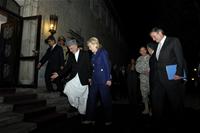 political, economic and social situation in Pakistan, as well as to all countries that have any attitude towards what's happening in Pakistan and Afghanistan. The second group of documents that is frequently seen in the published in the last 4 days series, is related to Iran. There is a third heterogeneous group, in which there are cables for individual political leaders around the world, directions for additional surveillance (only two for now - for the UN and for Bulgaria), personal characteristics, internal political assessments, etc.
political, economic and social situation in Pakistan, as well as to all countries that have any attitude towards what's happening in Pakistan and Afghanistan. The second group of documents that is frequently seen in the published in the last 4 days series, is related to Iran. There is a third heterogeneous group, in which there are cables for individual political leaders around the world, directions for additional surveillance (only two for now - for the UN and for Bulgaria), personal characteristics, internal political assessments, etc.
The fast media have already revealed a large part of what has been published so far, especially with regard to the personal characteristics of leading global figures like the French president Nicolas Sarkozy, the German chancellor Angela Merkel, the British PM David Cameron and his minister of finance George Osborne, the Italian PM Silvio Berlusconi, the Libyan leader Muammar al Qaddafi, the Russian state leadership, the British royal family and many others.
It was these qualifications that caused the sharpest reactions around the globe and also the fundamental question - what impact could the publication of these cables have? I will not review in details all the documents but only those that are directly related to our country and the European Union.
Bulgaria came under the spotlight
The document signed personally by Secretary of State Hillary Clinton is very interesting as it is addressed to the American liaison in Sofia. It is interesting firstly because it all seems that for the first time the gathering of overall, indeed overall information of our country is required - from political leaders and the government to demographic trends and minorities. A complete analysis, a longitudinal and cross-section - this is what is required from the agents based in Bulgaria. This means that for some reasons our country has turned into an interesting object for the formation of American foreign policy priorities.
Secondly it is interesting because, in fact, this document was sent on June 16, 2009 - a little before the change of power in Bulgaria. And the third reason, for which I got interested in it is the publishing of this document against the backdrop of the sometimes hysterical hyper-activity of the American ambassador James Warlick, who by the way came to Bulgaria in the autumn of 2009. In other words - after the receipt of the State Department's directive. Besides, he came to Bulgaria because the term of his predecessor Nancy McEldowney was terminated earlier because she was invited to take a higher position in the State Department.
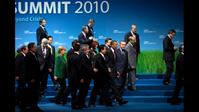 The main priorities the directive requires collecting data of are just smashing:
The main priorities the directive requires collecting data of are just smashing:
- Rule of Law, Corruption, and Crime;
- National Leadership;
- Political Evolution and Democratic Reform;
- Energy Security and Foreign Relations, containing the sub-groups Energy Security, Russia, the EU, Black Sea, the Balkans and other regional neighbours, the US, international organisations and other foreign relations;
- financial stability, economic development and social challenges which is also divided into sub-groups: financial stability and economic development, money laundering, demography, minorities and human rights;
- National Security, including: NATO, Force Structure, Modernization, and Readiness, Proliferation and Counterproliferation, Counterterrorism and Terrorism, Information to Support US Military Operational Planning;
- Telecommunications Infrastructure and Information Systems.
Further on all these subjects are detailed in the document and create the impression that obviously the US wanted to understand where the political leaders and political parties come from, how are they being financed, how is this reflected in the general situation of the state in terms of economic, political, social situation and in terms of national security. Also impressive is the demand of details on organised crime (including leaders, connections to the government and foreign entities, drugs and trafficking of people, credit cards frauds, etc). Details are required in the area of cyber-crime too, as well as on the government's plans to fight it.
And another curious element - an assessment is required about the vulnerability, personality, financial, health, and biometric information about current and emerging leaders and ... advisers.
Obviously the State Department is finding it hard to categorise our country which is why it requires information under the title "Political Evolution and Democratic Reform" about the popular attitudes about Bulgaria's evolving political, philosophical, and regional identity. As well as information about opposition and extremist groups, including domestic and foreign support.
Quite provoking is the instruction for more information in the area of energy. 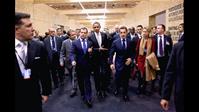 There the following is required literally: Policies, plans, and efforts to diversify energy sources and develop, rehabilitate, or expand energy infrastructure, including investment in capacity, efficiency, storage, nuclear power, flex-fuel, or other sources of alternative energy. Details about financing strategies, and openness to foreign investment. Willingness, plans, and efforts to develop and implement unified Europe energy security strategy. Declared and secret energy agreements with Russia, Iran, other Caspian basin countries, and others.
There the following is required literally: Policies, plans, and efforts to diversify energy sources and develop, rehabilitate, or expand energy infrastructure, including investment in capacity, efficiency, storage, nuclear power, flex-fuel, or other sources of alternative energy. Details about financing strategies, and openness to foreign investment. Willingness, plans, and efforts to develop and implement unified Europe energy security strategy. Declared and secret energy agreements with Russia, Iran, other Caspian basin countries, and others.
Data is also required on the national energy policymakers, key commercial figures in the sector, and their relations with other national leaders. Aaaand last but not least - organised crime involvement in energy sector!
Here inevitably one asks himself the question - why do the Americans need all this data? And the even more important question - how do they manage to collect it since the current government in the morning says one thing, at noon it hints that it's not going to be like that and in the evening it turns its position 180 degrees? And since the US are so very interested in these data, are the Bulgarian authorities also interested in the described problems and do they collect the same information? If yes, what do they use it for?
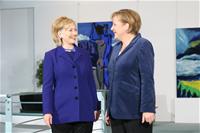 Very interesting are Hillary Clinton's demands to learn through Bulgaria where the European Union is going to. In the cable it is written in the sub-group "European Union":
Very interesting are Hillary Clinton's demands to learn through Bulgaria where the European Union is going to. In the cable it is written in the sub-group "European Union":
"Philosophies and motives behind leadership objectives, strategies, and efforts regarding the European Union (EU). Leadership and public views about levels of influence among European states, including relations between states and EU institutions as well as emergence of a preeminent state or a core alliance in Europe. Evidence of Bulgarian mismanagement of EU funding, and government efforts to ensure transparent management of financial aid.
Details about formal and informal alliances between Bulgaria and other EU states, including plans and efforts to cooperate on issues of mutual concern. Plans and efforts to cooperate with regional neighbors, EU members, and non-state actors to influence EU policies. Response to Russian efforts to influence EU policies through Bulgaria. Plans and efforts, including investment strategies, regarding European Security and Defense Policy (ESDP). Plans and efforts regarding EU expansion. Plans and efforts regarding specific EU policies and decisions", the directive says. It is important to note that for now there are no documents that could tell us how the implementation of these instructions is going on as is the case with other documents, published in the Guardian.
The Franco-German engine of the EU
Another important for us issue, as a European Union, observed closely by the 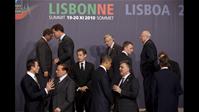 State Department, is the development of the Franco-German axis. The document, published by the British daily and related to this issue, is based on the information of a person whose name is hidden and is not clear what kind of a source he is - be it a part of the agency network of the US or a local who had decided to share his impressions with the American authorities. The cable is about a Franco-German summit at which the French president Nicolas Sarkozy is trying to win Germany's support for his initiative for the creation of the Mediterranean Union. The document is dated December 14, 2007.
State Department, is the development of the Franco-German axis. The document, published by the British daily and related to this issue, is based on the information of a person whose name is hidden and is not clear what kind of a source he is - be it a part of the agency network of the US or a local who had decided to share his impressions with the American authorities. The cable is about a Franco-German summit at which the French president Nicolas Sarkozy is trying to win Germany's support for his initiative for the creation of the Mediterranean Union. The document is dated December 14, 2007.
A main focus in it is the description of the exhausting and stressful style of the French leader. The source shares that the summit between German chancellor Angela Merkel and Nicolas Sarkozy was a clash of two tough personalities who were like "fire and water". Although the summit was in general productive, "tension is felt throughout the room when the two are together, then added that just being in a room with Sarkozy is enough to make anyone's stress levels increase".
The source also notes that though difficult the relations between Germany and France deepen during the preparation for the French EU presidency in the second half of 2008. Germany supports some of the French priorities like immigration and integration, as well as energy and environment. Paris and Berlin work closely on the third French priority, which above appeared to be of interest for the US too - the European Security and Defense Policy.
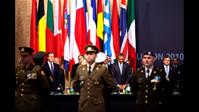 Many of the published documents so far are related to the personal characteristics of Nicolas Sarkozy, described as authoritarian and causing fear among his associates. Employees of his shared with their American partners that he behaved more or less like an emperor than a president (an impression one can easily get only while watching Sarkozy on TV, in fact).
Many of the published documents so far are related to the personal characteristics of Nicolas Sarkozy, described as authoritarian and causing fear among his associates. Employees of his shared with their American partners that he behaved more or less like an emperor than a president (an impression one can easily get only while watching Sarkozy on TV, in fact).
The good news
In fact, as controversial as these documents are, they are also to some extent useful because they reveal things which we have anyway thought about. Besides, they give a clear perspective of America's foreign policy priorities. Moreover, especially for the democratic and developed world, the publication of these documents can show their societies, whose leaders are significantly exposed, a much more realistic picture than they see in their own country. Of course this could also unleash again the little faded with the election of Barack Obama as a US president anti-American sentiments.
The bad news
After all, the bad impact from the publication of the WikiLeaks documents is 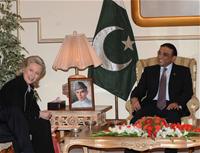 much more. On the one hand the personal impressions of American diplomats about world leaders could be used by their political foes, by the media or just by people with bad intentions, that would try to ruin the image of the US. On the other hand, these publications could seriously strain the already difficult relations of the US (and not only) with problematic countries like Iran, North Korea, Libya and even China. In general, a serious deterioration of relations could be expected with those countries, described as authoritarian, with closed societies, with no indications of democracy or freedom of speech or citizenship.
much more. On the one hand the personal impressions of American diplomats about world leaders could be used by their political foes, by the media or just by people with bad intentions, that would try to ruin the image of the US. On the other hand, these publications could seriously strain the already difficult relations of the US (and not only) with problematic countries like Iran, North Korea, Libya and even China. In general, a serious deterioration of relations could be expected with those countries, described as authoritarian, with closed societies, with no indications of democracy or freedom of speech or citizenship.
With regard to US's traditional partners - well, as it is known in politics there are not friendships, but rather interests, so as it is visible from the reactions so far, the partners will continue to be partners. The question is to what extent they will continue their recent way of work and whether they would not succumb to paranoia and reassurances.
And in the end again the question is raised - who and why needs the publication of such information? And risking again to inspire conspiracy thoughts, is the timing a coincidence, given the period when there are serious global shifts, the axis of influence is shifting and the world is still not quite sure who will exit from the financial and economic crisis dry? I still have no answer to these questions, so I will continue to read the documents. But it is worth asking ourselves another thing - who and why closed the WikiLeaks for several days? Moreover, according to some information, the website was closed by ... China.
*the other four newspapers are the American New York Times, the Spanish El Pais, the German magazine Spiegel and the French - Le Monde.